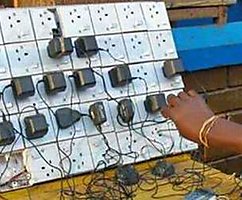Samsung and Huawei launch its platform for the smart home
 Bashny.Net
Bashny.Net
May was rich in news in the world of the Internet of things. We already wrote about the fact that Google announced a new platform for smart homes , and now their decisions shared with the Samsung line ARTIK chips and Huawei with its LiteOS. It seems that begins a new battle of giants.

ARTIK h4>
LightOS h4>

ARTIK h4> 
Introduced "Samsung» ARTIK - this three chips with different sizes and characteristics, as well as software and tools for the developer.

ARTIK 1 the smallest of the entire line of chips. It measures 12x12 millimeters processor Dual Core @ 250MHz + @ 80MHz with 1Mb + 4Mb SPI Flash memory, the motion sensor with a gyroscope, accelerometer and magnetometer, along with the BLE 4.0 on board. Operating System - Nucleus OS. The developers called the chip "mobile working horse" and assured of weeks without recharging.

Chip ARTIK 5 powerful and, therefore, takes up more space. Its dimensions make 29h25h3.5 millimeters. Inside is located ARM A7 Dual @ 1GHz processor with 512MB LPDDR3 + 4GB eMMC memory, as well as Wi-Fi module, BT / BLE and 60 pin x2. Operating System - Yocto 1.6 OS (Fedora). Input voltage is 3, 4V to 5V, and the output 1.8V / 100mA + 2.4V / 100mA. Also, the chip is equipped with HW Encoder & Decoder H.263 / H264 / MPEG-4 / VP8 (720p) @ 30fps and decoding of MPEG-2 / VC1 / Xvid video codec. The developers believe this processor balance between size, performance and consumption.

ARTIK 10 - the most powerful and the biggest chip of the entire line. 39x29x3, 5 mm board encompassed ARM A15x4@1.3GHz + A7x4@1.0GHz processor and 2GB LPDDR3 + 16GB eMMC memory Yocto 1.6 (Fedora) operating system. Wi-Fi, BT / BLE are included, as well as audio and video codecs supporting 1080p resolution. 80 pin and 40 pin x2 will connect all the necessary and the consumption stated the same as that of the ARTIK 5. Samsung claims that this chip is good on the whole market and will enable the Internet of Things to do something that was previously not possible.
Each chip has different levels and security protocols, and Samsung confidently declare high-level security of their chips. Samsung plans to convert to ARTIK most of their development - smart phones, televisions and appliances. This will speed up and standardize development.
Sign up for alpha testing can here .
LightOS h4> 
Chinese company Huawei has decided not to lag behind its competitors, according to ComputerWorld, and offered his solution for smart homes with its highlight. This operating system is called LightOS and the name was chosen for a reason: this applies to OS GitHub under ISC license and can be copied , committed to change and released for free. At a minimum LightOS may take about 10 (!) Kilobytes and is designed to run on minimal power, making it suitable for a huge list of devices.
Devices using LightOS, can be controlled remotely or gather information. Moreover, the operating system can be installed on devices with Android on board.
All this looks like a battle begins between the world's largest corporations for a place under the sun on the large market of the future Internet of Things. The good news: as if they did not happen to win this war should consumers.

Source: geektimes.ru/company/iridiummobile/blog/250812/
Tags
See also
Netatmo - stylish core for smart home
Smart mirror from Panasonic gives tips on appearance
Retro Console "Pintendo" with his own hands for a girl
Smart clock in conjunction with the smart home: fly or not fly?
Smart light: the possibilities for control of lighting
5 best gifts for the smart home
SAM socket for smart home
A Russian stove for the eco house with his own hands
HOW TO BECOME A clever woman
Floating island platform from Alexander Lotershtayna for owners of houses near the water.























